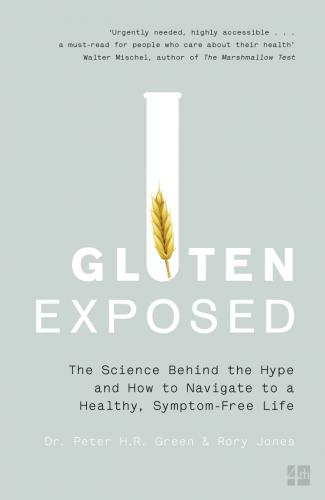PART V: THE BRAIN-GUT-GLUTEN CONNECTION
Chapter 26: Autism Spectrum Disorders and ADHD
Chapter 27: Schizophrenia—Revisiting “Bread Madness”
Chapter 28: Brain Fog—Neurology or Meteorology?
Chapter 29: The Stress of Holding Back
PART VI: NAVIGATING A GLUTEN-FREE LIFE
Chapter 30: Nondietary Therapies—the Drug Pipeline
Chapter 32: Myths and Misconceptions
APPENDIX A: Diets Through the Ages
APPENDIX C: Arsenic and Mercury Guidelines
APPENDIX D: Guidelines for Eating Gluten-Free
APPENDIX E: Scientific Articles and Studies
Also by Dr. Peter H. R. Green and Rory Jones
All the information in this book is based on current scientific knowledge about the effect on the body of gluten and the many foods, drugs, and supplements that we ingest. It is derived from an in-depth analysis of current medical literature, extensive clinical experience, patient and professional interviews, as well as ongoing research into the various manifestations and conditions ascribed to gluten-related disorders.
Other medical experts may have differing opinions and interpretations of the medical literature. Wherever pertinent, the authors have attempted to note conflicting points of view on key issues as well as topics that have not as yet been scientifically resolved.
Many of the peer-reviewed articles we have consulted may not be readily accessible to all readers. For this reason, we have not included footnotes for all medical facts and figures. Instead, we have listed good basic review articles and books for different subjects in the appendices.
All references to the “Center” refer to the Celiac Disease Center at Columbia University.
NOTE: This book is not a self-diagnosis manual. It is intended to generate informed patients who know what questions to ask of their physicians and how to understand the answers.
The fewer the facts, the stronger the opinion.
—ARNOLD H. GLASOW
Simple solutions are always appealing. In the last few years, gluten has become the ultimate villain—the Wicked Witch, Darth Vader, the Joker, and Hannibal Lecter rolled into one devouring multisystem ravager. It is blamed for draining our brain, blowing up our bellies, invading our nervous system, and setting fire to our guts. A recent bestselling book claimed that: “Brain disease can be largely prevented by the choices you make in life …” If only it were that simple.
Almost a third of all American and UK consumers are trying to avoid gluten. By any reckoning, a significant portion of the buying public is focused on the gluten in our food supply and on their plates.
Gluten is implicated in everything from heart disease, neuralgia, sore muscles, exhaustion, “brain fog,” headaches, autism, diabetes, arthritis, curious rashes, schizophrenia, dementia, weight loss, fibromyalgia, and irritable bowel syndrome to plain “it makes me feel sick-”itis. Yet most of these claims do not hold up.
In fact, it has become increasingly hard to swallow the story line written by the media as well as friends, family members, and various alternative health care professionals. The menu at this feast of confusion includes wheat and the different proteins within it, genes, germs, fungi, antibiotics, herbicides, enzymes, supplements, and anything else that travels through the intestinal tract. It is a multicourse, multisystem, increasingly nonscientific boiling pot.
Unfortunately, the food industry and general population got onto a gluten-free diet ahead of the medical community, which is now playing scientific catch-up. With the advent of the Internet, everyone has become a medical researcher. This has left room for the public to run away with ideas and point fingers at gluten as the cause for anything and everything.
Gluten has become a media-borne epidemic. But beware: pseudoscience can be hazardous to your health.
The Promise of Miracles
He took a grain of truth and made a loaf of baloney.
—ANONYMOUS
The majority of the information available about the effect of gluten on the body is only partly correct or almost wholly incorrect, and few people have the background or knowledge to question its accuracy. Most of the claims touted by TV hosts, books by “experts,” and websites featuring the words natural or doctor recommended do not withstand scrutiny.
Which is exactly what we intend to do. Starting in the gut and working up to the brain and back, we will explore the many claims, conditions, treatments, and diets to diagnose exactly what gluten does and does not cause or cure.
In 1996, Alan Greenspan, then the Federal Reserve Board chairman, used the phrase irrational exuberance as a warning that the market might be overvalued. Today, this same phrase could be used to describe the emotions surrounding gluten, which is being blamed for many of the physical as well as psychological problems people suffer from. And it is becoming increasingly scientifically clear that this focus on gluten as the culprit behind “all that ails ye” is increasingly irrational.
Gluten—the “One Size Fits All” Myth
There are in fact two things, science and opinion; the former begets knowledge, the latter ignorance.
